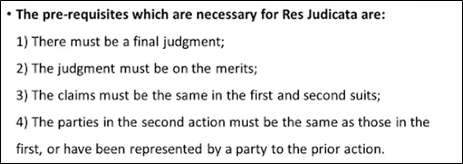PREVIOUS
SC on Henderson Doctrine
December 21 , 2024
369 days
747
0
- In a recent case, the Supreme Court explained Henderson doctrine.
- It is a natural outcome of the Indian doctrine of constructive Res-judicata codified in Explanation IV of Section 11 of the Code of Civil Procedure (CPC).
- It was propounded in the English case of Henderson versus Henderson, 1843.
- The Court observed that all issues arising from the same subject matter should be addressed in a single proceeding.
- It will prevent repetitive and vexatious legal challenges for the same.
- The court has observed that once a matter has been adjudicated by a competent jurisdiction, parties are categorically barred from re-litigating issues that could have been raised in the previous proceedings, irrespective of negligence or inadvertence.
- Res Judicata literally translates to "a thing already decided".
- It applies when:
- The matter directly and substantially in issue was previously decided
- The parties are the same or claim under the same title
- The previous court was competent to try the suit.

Leave a Reply
Your Comment is awaiting moderation.


